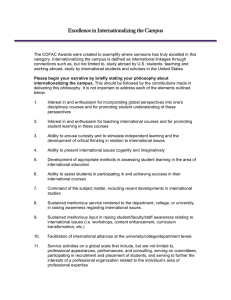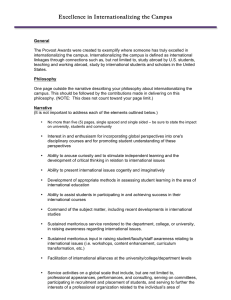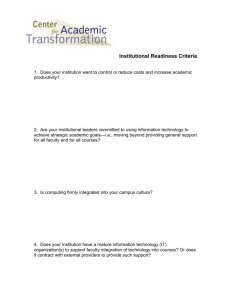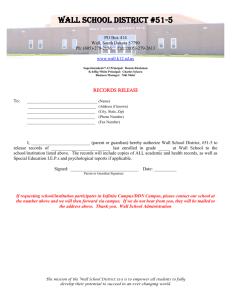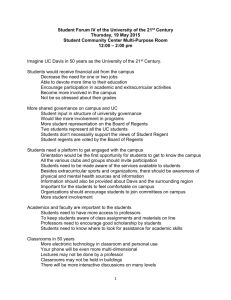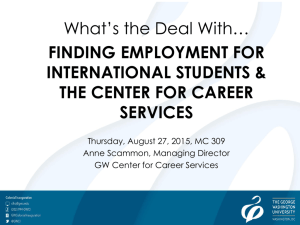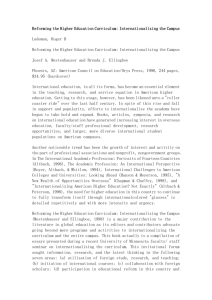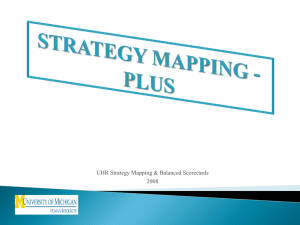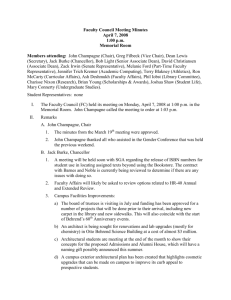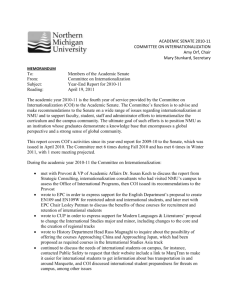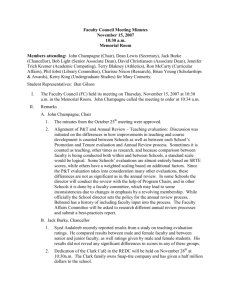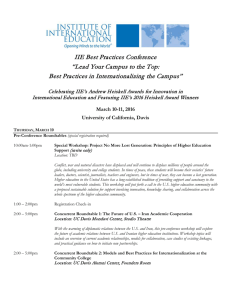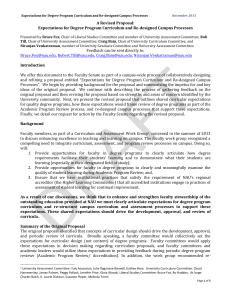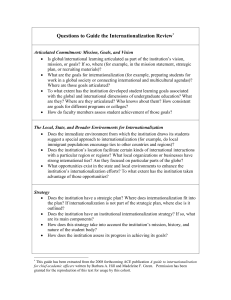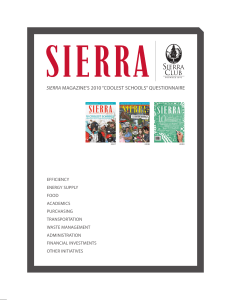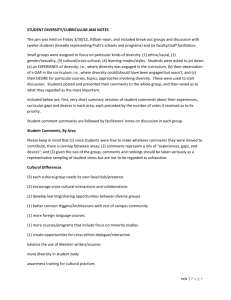Internationalizing the Curriculum Workshop 1: What does it mean for
advertisement
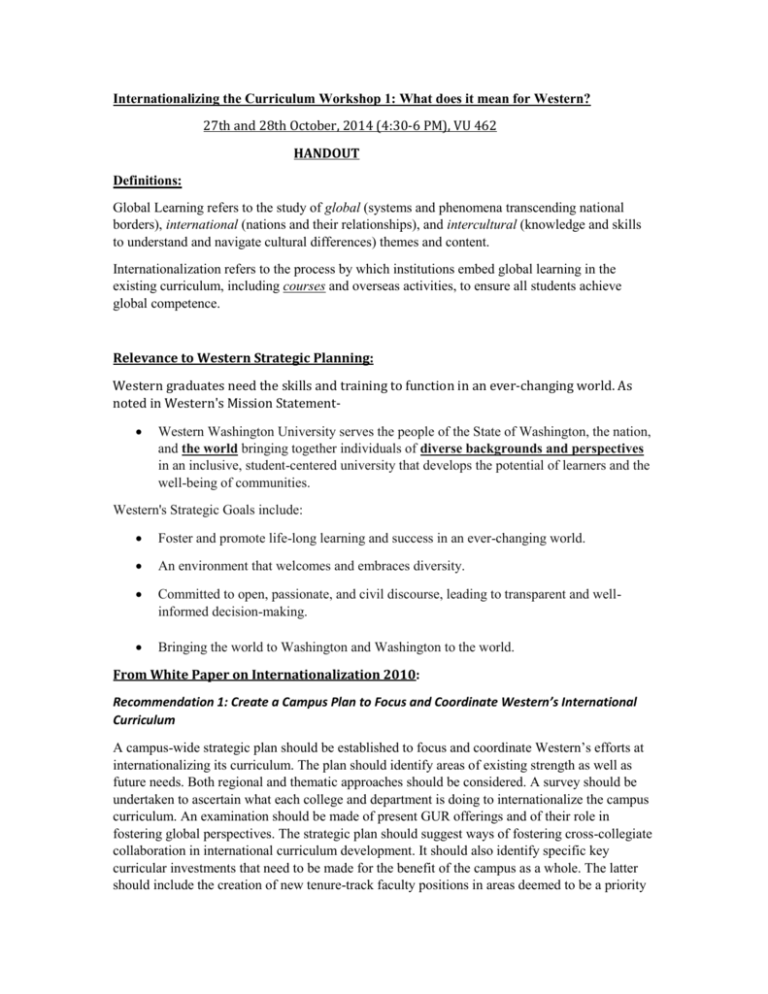
Internationalizing the Curriculum Workshop 1: What does it mean for Western? 27th and 28th October, 2014 (4:30-6 PM), VU 462 HANDOUT Definitions: Global Learning refers to the study of global (systems and phenomena transcending national borders), international (nations and their relationships), and intercultural (knowledge and skills to understand and navigate cultural differences) themes and content. Internationalization refers to the process by which institutions embed global learning in the existing curriculum, including courses and overseas activities, to ensure all students achieve global competence. Relevance to Western Strategic Planning: Western graduates need the skills and training to function in an ever-changing world. As noted in Western's Mission Statement Western Washington University serves the people of the State of Washington, the nation, and the world bringing together individuals of diverse backgrounds and perspectives in an inclusive, student-centered university that develops the potential of learners and the well-being of communities. Western's Strategic Goals include: Foster and promote life-long learning and success in an ever-changing world. An environment that welcomes and embraces diversity. Committed to open, passionate, and civil discourse, leading to transparent and wellinformed decision-making. Bringing the world to Washington and Washington to the world. From White Paper on Internationalization 2010: Recommendation 1: Create a Campus Plan to Focus and Coordinate Western’s International Curriculum A campus-wide strategic plan should be established to focus and coordinate Western’s efforts at internationalizing its curriculum. The plan should identify areas of existing strength as well as future needs. Both regional and thematic approaches should be considered. A survey should be undertaken to ascertain what each college and department is doing to internationalize the campus curriculum. An examination should be made of present GUR offerings and of their role in fostering global perspectives. The strategic plan should suggest ways of fostering cross-collegiate collaboration in international curriculum development. It should also identify specific key curricular investments that need to be made for the benefit of the campus as a whole. The latter should include the creation of new tenure-track faculty positions in areas deemed to be a priority as well as funding for international curricular enhancement and revision on a recurring basis. The plan should address ways to send more of our students and faculty abroad and to incorporate our international partners more effectively into Western’s learning and teaching efforts. Recommendation 2: Support Efforts within Colleges and Departments to Develop Curricula with International and Global Perspective In terms of expertise, Western’s faculty already offers a rich trove of teaching and research experience in multiple areas that crucially inform the discipline of international studies. However, these resources must be better focused toward a common goal. Cross- disciplinary courses such as the FIGs program should be expanded, and collaborative efforts between colleges should be encouraged and supported at the university level. It needs be emphasized at every opportunity that achieving a well-rounded education in the 21st century requires developing an international perspective regardless of individual academic discipline. Efforts should be undertaken to demonstrate to students how gaining an international perspective within the context of any major or minor can be a valuable asset to an undergraduate educational experience. Western’s curriculum should encourage students to pursue the study of international languages and to utilize them in their course work on campus in a number of disciplines and while studying abroad. The goal should be to develop greater “transcultural” and “translingual competence” on the part of our students. In this regard, Western’s Department of Modern and Classical Languages provides an important resource and hub for such curricular undertakings. Additional students should be encouraged to pursue double majors and minors involving a world language. WWU faculty who bring an international perspective to either their teaching or their research should be rewarded by having this dimension of their academic work weighed more heavily in tenure and promotion processes. Academic units who propose hiring new faculty who can bring such perspectives to campus should be given some priority in the allocation of funding for new positions. The present International Seed Grant Program developed by the Center for International Studies, whereby two grants of $1500 apiece are available to support faculty in their efforts to add international content to the curriculum and to the campus community, might be expanded to include support for the hosting of international conferences at Western. Suggested Global Competencies: 1. Knowledge of world geography and history. 2. Understanding of diversity of values, beliefs, ideas, and worldviews. 3. Understanding of one's identity and culture in the context of an ever-changing world. 4. Curiosity and openness toward new opportunities, ideas, and ways of thinking. 5. Awareness of ethnic and cultural differences. 6. Ability to examine issues from multiple perspectives. 7. Ability to think critically and creatively, and integrate knowledge of the world 8. Ability to communicate effectively in a second language and interact with people from other cultures. 9. Ability to cope with unfamiliar and challenging settings with resiliency. 10. Ability to locate information and investigate issues about international topics.

